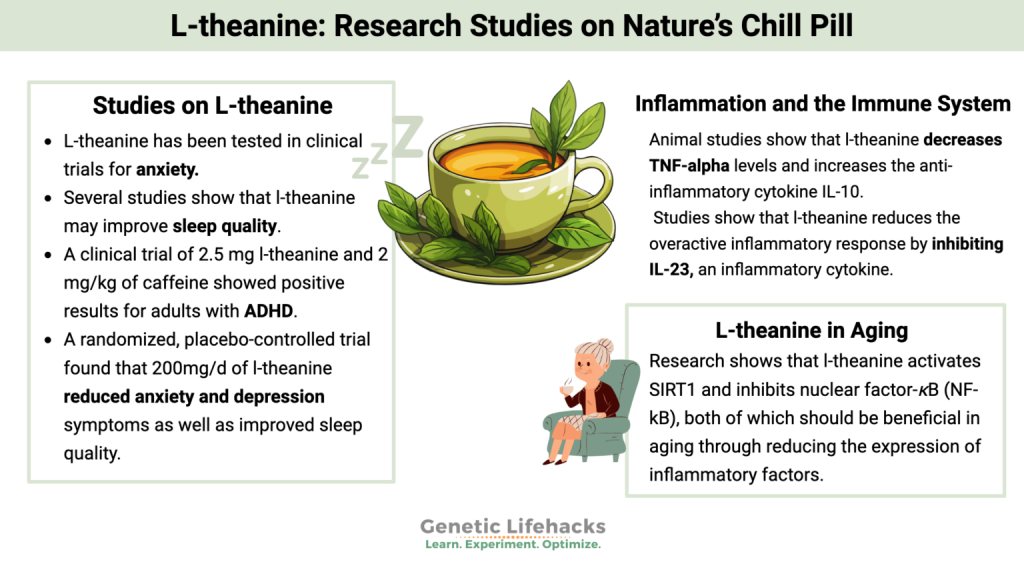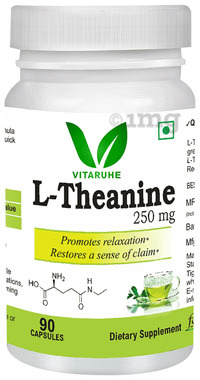Discover the science-backed benefits of L-Theanine for Stress and Focus. Learn safe dosage, side effects, and how this natural amino acid boosts relaxation and mental clarity.
Introduction L-Theanine
Are you struggling with constant stress, lack of focus, or poor sleep? One natural solution that’s gaining worldwide attention is L-Theanine for Stress and Focus. This powerful amino acid, commonly found in green tea leaves, has been scientifically studied for its calming and focus-enhancing effects.
Unlike synthetic medications, L-Theanine works gently with your body, helping reduce anxiety, improve mental clarity, and even promote better sleep quality—without causing drowsiness. In this guide, we’ll explore the proven benefits, safe dosage, and research-backed insights on how L-Theanine can support your mind and body.
Why L-Theanine is Gaining Attention
L-Theanine for stress and focus is becoming a go-to solution for many seeking calm clarity in a hectic world. Found primarily in green tea, this natural amino acid helps balance brain waves, promoting relaxation without sedation. Whether you’re dealing with work pressure, study stress, or just daily mental fatigue, L-Theanine offers a gentle boost to your concentration and emotional stability. In this guide, we’ll dive into the benefits, science, optimal dosage, and how to incorporate it safely into your routine.
Scientific studies suggest that it works by increasing alpha brain waves, promoting a calm yet alert state, which is why students, professionals, and even athletes use it as part of their daily routine.
For more information about why L-Theanine is used for stress and focus, you can also visit the link Green Tea Extract Health Benefits

What is L-Theanine?
L-theanine is an amino acid with a similar chemical structure to glutamate, which is a neurotransmitter. It is found in green tea and mushrooms, and l-theanine is readily available as a supplement.
People often take L-theanine supplements for anxiety, and studies do back up this claim somewhat. But l-theanine is more than just a ‘chill pill’, as you will see from the research on inflammation and brain health.
In tea, L-theanine makes up about 1 -2% of the dry weight of the leaves. This is true for both black and green teas, with different tea varieties containing different amounts.[ref]
On average, a cup of tea contains about 25mg of l-theanine. Interestingly, l-theanine takes away some of the bitter taste of caffeine by binding to the taste receptors for umami, a savory taste.[ref]
In the brain, l-theanine binds to glutamate receptors. But l-theanine doesn’t have as strong an affinity to the receptor as glutamate, so it doesn’t replace it entirely. Instead, it somewhat inhibits glutamate reuptake and increases brain levels of GABA.[ref] GABA acts as an inhibitory neurotransmitter, putting the brakes on brain excitement.
Recent research also shows that l-theanine binds to cannabinoid receptor 1 (CB1). This competitive binding then inhibits the CB1 receptor.[ref]
Benefits of L-Theanine
1. Reduces Stress and Anxiety
Research shows that L-Theanine promotes relaxation by increasing levels of serotonin and GABA, neurotransmitters responsible for calmness and mood regulation.
Study Reference – PubMed
2. Enhances Focus and Cognitive Function
When combined with caffeine (like in green tea), L-Theanine smooths out the “crash” effect, giving users steady focus and alertness. This synergy is widely studied in the field of nootropics.
(Internal link idea: Connect “nootropics” to your article on Best Nootropics for Focus.)
3. Improves Sleep Quality
L-Theanine doesn’t act like a sleeping pill, but it helps the brain relax before bedtime, leading to deeper and more restorative sleep. Many people report falling asleep faster and waking up refreshed.
4. Supports Heart and Immune Health
Preliminary studies suggest that regular use of L-Theanine may lower blood pressure in stressful situations and support immune function.

How L-Theanine Works in the Brain
L-Theanine crosses the blood-brain barrier and influences neurotransmitters like dopamine, GABA, and serotonin. It increases alpha brain waves, the same pattern associated with meditation and mindfulness.
This effect is why users describe it as a supplement that provides “calm focus” rather than sedation.
Recommended Dosage and Safe Use
-
Stress relief: 100–200 mg per day
-
Focus with caffeine: 200 mg L-Theanine + 50–100 mg caffeine
-
Better sleep: 300–400 mg before bed
Always start with a lower dose and increase gradually if needed. Pregnant women, nursing mothers, or those on medication should consult a healthcare provider.
Supplements like Java Burn also support overall health, sleep, and metabolism [ref read].
Possible Side Effects of L-Theanine
L-Theanine is generally safe and well-tolerated. However, some users may experience:
-
Mild headaches
-
Stomach discomfort
-
Slight dizziness at higher doses
No severe side effects have been reported in scientific studies, making it one of the safest natural stress relief supplements.
Healthline Reference – L-Theanine Safety
Studies on l-theanine for anxiety:
L-theanine has been tested in clinical trials for anxiety. Let’s take a look at some of the results:
A 2006 crossover trial found that theanine reduced heart rate and stress response molecules in response to acute stress tasks. The heart rate variability results showed that the reduction in heart rate was “attributable to an attenuation of sympathetic nervous activation.”[ref]
A randomized, placebo-controlled, crossover, and double-blind trial looked at the effects of 200mg/d of l-theanine on adults with no mood issues. The results showed a decrease in depression and anxiety traits as well as better sleep. Cognitive function, executive function, and verbal fluency all improved.[ref]
On the other hand, an 8-week trial in people with Generalized Anxiety Disorder found that l-theanine did not reduce anxiety.[ref]
Researchers looked at different doses of l-theanine and measured the startle response. [ref] Doses of 200-400 mg did decrease the startle response, but at doses over 400 mg, there was no additional benefit.
Related article: Inflammation genes and anxiety

Learn more about why L-Theanine dosage is used for stress and focus. You can also visit the [Ref. link]
Who Should Consider Taking L-Theanine?
-
Students preparing for exams
-
Professionals with high-stress jobs
-
Individuals sensitive to caffeine jitters
-
People struggling with sleep quality
-
Anyone looking for a natural stress and focus booster
Natural Appetite Suppressants That Work for readers looking into holistic wellness.
L-Theanine vs Other Stress Relief Supplements
| Supplement | Effect | Risk Level | Best For |
|---|---|---|---|
| L-Theanine | Calm focus | Very low | Stress + Focus |
| Valerian Root | Relaxation | Medium | Sleep support |
| Ashwagandha | Stress reduction | Low | Anxiety & cortisol |
| GABA Supplements | Relaxation | Medium | Short-term stress |
Read more about natural metabolism boosters in our Java Burn Ingredients guide.
Sleep studies with l-theanine:
It would make sense that something that can decrease anxiety would help people who have sleep problems due to constantly worrying about things all night. Plus, supplement sellers of L-theanine often promote its use for sleep. But, to be honest, the research on the topic is slim.
- A randomized, double-blind, placebo-controlled trial using 100 mg of l-theanine 4x per day in boys with ADHD showed some improvements in sleep quality.[ref]
- Additionally, the clinical trial mentioned above for stress-related symptoms also noted improved sleep quality scores in participants taking l-theanine.[ref]
- In a 2024 study on sleep quality in cancer patients with insomnia, 200 mg of L-theanine “had statistically significant improvements in insomnia in comparison to placebo”, however, the same study found that L-theanine was not as effective as melatonin in improving sleep quality. [ref]
Will L-theanine give you nightmares?
An animal study showed that GABA plus l-theanine effectively decreased the time it took to fall asleep and the time spent sleeping. It also almost doubled the time spent in REM sleep.[ref] I mention this animal study because some people report that l-theanine causes vivid dreams, which may go along with changes in REM sleep.
The rest of this article is for Genetic Lifehacks members only. Consider joining today to see the rest of this article.
User Reviews – What People Say
Many users report that L-Theanine helps them stay calm in stressful environments without feeling sleepy. Students often highlight improved study focus, while office workers appreciate its ability to reduce anxiety during presentations or meetings.
One common theme in reviews: the synergy with caffeine. People love that it reduces caffeine jitters while improving productivity.

FAQs about L-Theanine for Stress and Focus
Q1. Can I take L-Theanine every day?
Yes, daily use is safe and commonly practiced.
Q2. How long does it take to work?
Most people feel effects within 30–45 minutes.
Q3. Can I take L-Theanine with coffee?
Yes, it works best with caffeine for smooth, jitter-free focus.
Q4. Is L-Theanine safe for kids?
It is not recommended without medical supervision.
Q5: Is L-Theanine for stress and focus safe to take daily?
Most studies show that L-Theanine is safe for daily use in recommended dosages (100–400 mg). It does not cause dependency or severe side effects.
Q6: How much L-Theanine for stress and focus should I take?
The effective dosage is typically between 100 and 200 mg per day for stress relief and mental focus. Higher doses (up to 400 mg) are sometimes used for sleep, but always consult a healthcare professional.
Q7: Can L-Theanine for stress and focus be combined with caffeine?
Yes! One of the most studied combinations is L-Theanine with caffeine (as found in green tea). Together, they enhance alertness while reducing jitteriness—making it a perfect duo for focus.
Conclusion
In summary, **L-Theanine for stress and focus** is one of the most effective natural supplements to support relaxation, improve concentration, and promote better sleep. Scientific research continues to highlight its unique ability to calm the mind while sharpening mental performance—making it an excellent choice for students, professionals, and anyone struggling with daily stress.
When combined with healthy lifestyle habits such as balanced nutrition, regular exercise, and proper sleep, L-Theanine can deliver long-lasting benefits without the common side effects of synthetic options.
If you’re considering natural ways to manage stress and improve focus, **L-Theanine supplements** are worth exploring. Always consult your healthcare provider before starting, especially if you take medications or have existing conditions. By using L-Theanine wisely, you may experience greater resilience, clarity, and calm in everyday life.
To learn more about other natural health boosters, check out our guide on Best Natural Metabolism Boosters.
